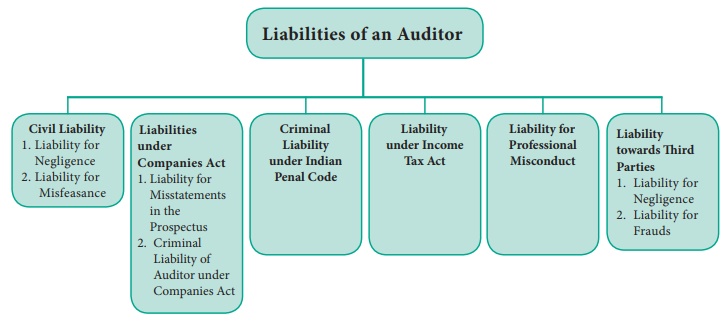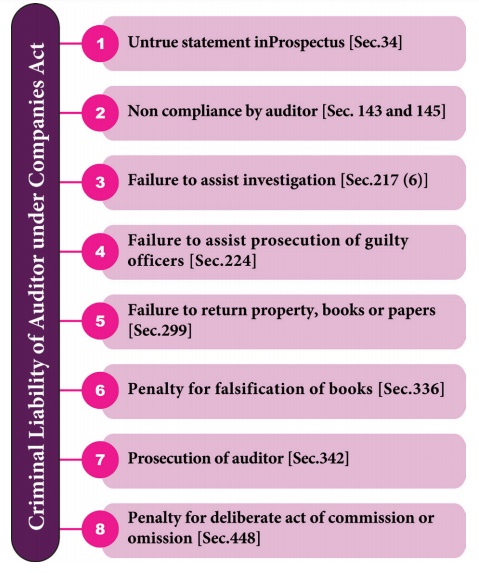Auditing - Liabilities of an Auditor | 12th Auditing : Chapter 9 : Qualifications, Rights and Duties of Auditor
Chapter: 12th Auditing : Chapter 9 : Qualifications, Rights and Duties of Auditor
Liabilities of an Auditor
Liabilities of an Auditor:
A
Chartered Accountant is associated with the valuable profession. His primary
duty is to present a report on the accounts and statements submitted by him to
members of the company. He is responsible not only to the members of the
company but also to the third parties of the company, i.e., creditors, bankers
etc.

Normally
the liability of auditor based on the work done by him as professional
accountant and carry out his work due care, caution and diligence. The nature
of liabilities of an auditor is discussed below:
1. Civil Liability:
1. Liability for Negligence:
Negligence
means breach of duty. An auditor is an agent of the shareholders. He has to
perform his professional duties. He should take reasonable care and skill in
the performance of his duties. If he fails to do so, liability for negligence
arises. An auditor will be held liable if the client has suffered loss due to
his negligence. It should be noted that an auditor will not be liable to
compensate the loss or damage if his negligence is not proved.
2. Liability for Misfeasance:
Misfeasance
means breach of trust. If an auditor does something wrongfully in the
performance of his duties resulting in a financial loss to the company, he is
guilty of misfeasance. In such a case, the company can recover damages from the
auditor or from any officer for breach of trust or misfeasance of the company.
Misfeasance proceedings can be initiated against the auditor for any untrue
statement in the prospectus or in the event of winding up of the company.
2. Liabilities under Companies Act
The
following are the liabilities of an auditor under the provisions of the
Companies Act.
(1) Liability for Misstatements in the
Prospectus [Sec.35]:
An
auditor shall be held liable to compensate every person who subscribes for any
shares or debentures of a company on the faith of the prospectus containing an
untrue statement made by him as an expert. The auditor shall be liable to
compensate him for any loss or damages sustained by him by reason of any untrue
statement included therein. The auditor may escape from liability if he proves
that:
·
The prospectus is issued without his knowledge
or consent.
·
He withdrew his consent, in writing before
delivery of the prospectus for registration.
·
He should have withdrawn his consent after
issue of prospectus but before allotment of shares and reasonable public notice
has given by him regarding this.
(ii) Criminal Liability of Auditor under
Companies Act:

1. Untrue statement in Prospectus [Sec.34]
The auditor is liable when he authorizes a false or
untrue prospectus. When a prospectus includes any untrue statement, every
person who authorizes the issue of prospectus shall be imprisoned for a period
of six months to ten years or with a fine, which may be three times the amount
involved in the fraud or with both.
2. Non compliance by auditor [Sec. 143 and 145]:
If the
auditor does not comply regarding making his report or signing or authorization
of any document and makes willful neglect on his part he shall be punishable
with imprisonment upto one year or with fine not less than ₹. 25,000 extendable
to ₹. 5,00,000.
3. Failure to assist investigation [Sec.217
(6)]:
WhenCentral
Government appoints an Inspector to investigate the affairs of the company, it
is the duty of the auditor to produce all books, documents and to provide
assistance to the inspectors. If the auditor fails to do so he shall be
punishable with imprisonment upto one year and with fine up to ₹.1,00,000.
4. Failure to assist prosecution of guilty
officers [Sec.224]:
An
auditor is required to assist prosecution when Central Government takes any
action against the report submitted by the Inspector. If he fails to do so, he
is found guilty and is punishable.
![]() 5. Failure to return property, books or papers [Sec.299]:
5. Failure to return property, books or papers [Sec.299]:
When a
company is wound up the auditor is supposed to be present and subject himself
to a private examination by the court and is also liable to return to the court
any property, books or papers relating to the company. If the auditor does not
comply, he may be imprisoned.
6. Penalty for falsification of books
[Sec.336]:
An
auditor when destroys, mutilates, alters or falsifies or secrets any books of
account or document belonging to the company. He shall be punishable with
imprisonment and also be liable to fine.
7. Prosecution of auditor [Sec.342]:
In the
course of winding up of a company by the Tribunal, if it appears to the
Tribunal that an auditor of the company has been guilty of an offence, it shall
be the duty of the auditor to give all assistance in connection with the
prosecution. If he fails to give assistance he shall be liable to fine not less
than ₹ 25,000 extendable upto ₹.1,00,000.
8. Penalty for deliberate act of commission or
omission [Sec.448]: If an auditor deliberately make a statement in
any report, certificate, balance sheet, prospectus, etc which is false or which
contains omission of material facts, he shall be punishable with imprisonment
for a period of six months to ten years and fine not less than amount involved
in fraud extendable to three times of such amount.
3. Criminal Liability under Indian Penal Code
If any
person issues or signs any certificate relating to any fact which such
certificate is false, he is punishable as if he gave false evidence. According
to Sec.197 of the Indian Penal Code, the auditor is similarly liable for
falsification of any books, materials, papers that belongs to the company.
4. Liability under Income Tax Act [Sec.278]
·
For tax evasion exceeds ₹.1,00,000, rigorous
imprisonment of six months to seven years.
·
A person who induces another person to make and
deliver to the Income Tax authorities a false account, statement or declaration
relating to any income chargeable to tax which he knows to be false, he shall
be liable to fine and imprisonment of three months to three years. An auditor
may also be charged in case of wrong certification of account.
·
A Chartered Accountant can represent his
clients before the Income Tax Authorities. However, if he is guilty of
misconduct he can be disqualified from practicing.
·
An auditor can face imprisonment upto two years
for furnishing false information.
5. Liability for Professional Misconduct
The
Chartered Accountant Act, 1949 mentions number of acts and omissions that
comprise professional misconduct in relation to audit practice. The council of
ICAI may remove the auditor’s name for five years or more, if he finds guilty
of professional misconduct.
6. Liability towards Third Parties
There
are number of persons who rely upon the financial statements audited by the
auditor and enter into transactions with the company without further enquiry
viz. creditors, bankers, tax authorities, prospective shareholders, etc.
1. Liability for Negligence:
It has
been held in the court that auditor is not liable to third parties, as there is
no contract between auditor and third parties. He owes no duty towards them.
2. Liability for Frauds:
The
third parties can hold the auditor liable, if there is fraud on the part of
auditor even if there is no contractual relationship between auditor and third
parties. In certain cases negligence of auditor may amount to fraud for which
he may be held liable to third parties. But it must be proved that auditor did
not act honestly and he knew about it.
Related Topics